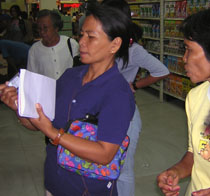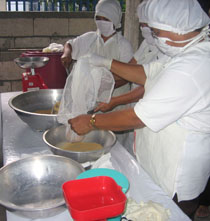| Laca Ginger Tea Processing Nata de Coco Production Malbog Dressmaking and Costume Hire Virgin Coconut Oil Youth Enterprise Jagna Porters Cooperative Seaweed Wholesaling Pottery Mattress Making |
Laca Ginger EnterpriseJagna, BoholTwo local assets
The Community Partnering Project helped bring these two assets together. A group of 9 women from Laca decided to research the feasibility of producing ginger tea-locally known as salabat. "Why wait and see? Even as old as we are, we can start with what we have" this was the attitude of the Laca Women's Group who decided to start a ginger enterprise. Researching feasibility
Next they spent time talking to potential customers to find out if there was a demand for salabat. They visited the local market and interviewed stall owners to see if they would sell their product. They were encouraged by the positive response they received. Raising capital The larger Laca women's group had previously accessed a government loan. Each of the 9 women put 2/3 of their share into a business-development fund. They used the funds to buy ginger and other production supplies to make powdered ginger tea for market testing. With their test product they discovered that there was local demand for their product, particularly from older people, fishermen and the workers at the local electric company. Building on local practices The group now meets 3 times a week to produce the tea. All members of the group are involved in the production or marketing of the salabat. When a member is absent, a family member will take her place.
Each member contributes a cup of rice for lunch on production days and a small amount of money is put aside from the enterprise takings to purchase toppings for the rice and snacks.
Ginger tea is sold to people in the local market primarily, although there are increasing sales to other regions.
Business matters Profits from the sales of salabat have been used to pay off the members' loans. The group is also setting aside 10% of their earnings for supplies, marketing costs and a small credit facility.
After covering these costs, each member takes home about P 180 per week for the 3 days work or P 720 per month. This is a sizeable amount in a community where the average household income is about P 4000 per month. Increased sales has meant that the initial P 60 per worker per production has risen to P 90. While this daily rate is less than the prevailing daily wage of P 120 in Laca, members point out that day labour wouldn't give them lunch or pay off the loan. By local standards, an additional P 720 of cash income is a substantial input into cash-poor households. Reported benefits
Governance Formally, the group has a president and office bearers, but the members describe the group as having a 'flat structure'. "I'm not just a mere member because she's the president. We share the same rights, we work together". Even though the group is registered as an association with the government department that provided the loan, the members rotate tasks and share in decision making. Future challenges and plans
Click here to view a short video about the development of the Laca Women's Group Ginger Enterprise |

